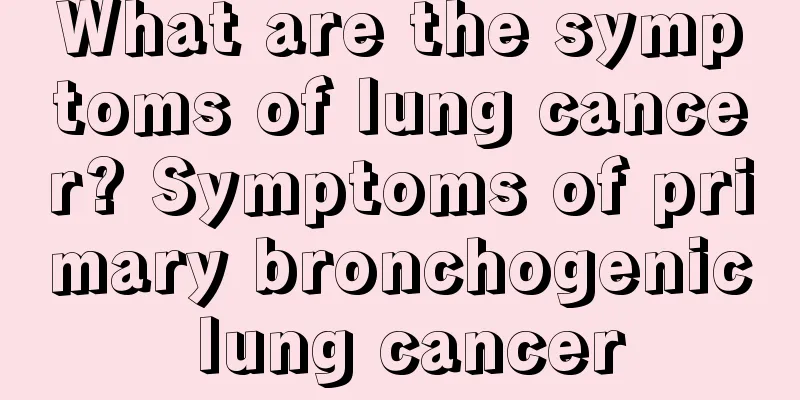What are the symptoms of lung cancer? Symptoms of primary bronchogenic lung cancer

|
Primary bronchogenic lung cancer is a common malignant tumor. After the disease is discovered in the early stage, the cure rate can reach 80% if it is treated as soon as possible. However, if the disease develops to the late stage, it may affect physical health. Therefore, patients must understand the early clinical manifestations of the disease and discover the disease as soon as possible to determine the symptomatic treatment plan. Primary bronchogenic lung cancer is a very complex disease that can cause a lot of harm after onset. If you want to diagnose the disease in the early stages, you must understand the relevant clinical manifestations to ensure that the disease can be discovered in time so that you can determine the symptomatic treatment plan in the later stages. Let's take a closer look at the symptoms of primary bronchogenic lung cancer. First, after primary bronchial lung cancer occurs, tracheal tumors can cause large airway stenosis. Because the cancerous tissue is rich in blood vessels and some tissues are necrotic, hemoptysis is also the primary symptom of lung cancer. In the later stage, as the disease progresses, there will be blood in the sputum, which is caused by the disease corroding the large blood vessels, especially the partial bronchial obstruction caused by the tumor, which can cause wheezing in some lung cancer patients. Second, when the tumor causes bronchial stenosis or the tumor metastasizes to the hilar lymph nodes and compresses the main bronchus or carina, it will metastasize to the pleura and produce a lot of pleural effusion. When it metastasizes to the pericardium, it will produce pericardial effusion, diaphragmatic paralysis, superior vena cava obstruction and extensive lung fatigue, which can affect lung function and cause chest tightness and difficulty breathing. Third, weight loss is also a common symptom of primary bronchogenic carcinoma. When lung cancer develops to the late stage, tumor toxins will cause weight loss or cachexia. Subsequent tumor tissue necrosis can cause fever, and antibiotic treatment will have a better effect at this time. Fourth, the clinical manifestations of primary bronchogenic carcinoma include extrapulmonary manifestations caused by the impact of cancer on other systems, mainly abnormal changes in the endocrine, neuromuscular, connective tissue, blood system and blood vessels. Common manifestations include hypertrophic pulmonary osteoarthropathy, symptoms and signs caused by the secretion of gonadotropin, adrenaline and antidiuretic hormone, etc. The pathological conditions of primary bronchogenic lung cancer have been understood. After the patients have analyzed it clearly, they can determine the treatment plan based on different pathological characteristics. After all, the early, middle and late stage symptoms are different, and the treatment methods are also different. It is recommended that patients go to the hospital for examination as soon as possible and follow the doctor's instructions to improve their condition, otherwise the symptoms will worsen and cause more harm. |
Recommend
What kind of bonsai is suitable for indoors?
Everyone knows that the bedroom is a place for pe...
What is the reason for anal fever
The anus (commonly known as the buttocks) is an o...
Is the recurring hormone face a result of metabolism?
Nowadays, people take certain medications due to ...
What shoes should I wear if I have short legs
In daily life, we often see some girls who love b...
The benefits of foot massage to the body
Each of us hopes to have a healthy and strong bod...
Is melanoma related to genetics?
Is melanoma related to heredity? Experts suggest ...
What are the symptoms of insufficient blood supply to the head
Insufficient blood supply to the head means insuf...
Is it harmful to apply ginger on the scalp for a long time
Ginger is a common seasoning in our daily cooking...
Certain characteristic signs will appear after the early stage of skin cancer
Since the early symptoms of skin cancer are eryth...
What is a malignant hydatidiform mole
Malignant hydatidiform mole is a gestational trop...
What are the causes of high thyroid hormone
If the thyroid hormone is too high, it will often...
Herpetic stomatitis
For stubborn diseases like herpetic stomatitis, w...
What is the treatment for gastric cancer? There are three treatments
The presence of gastric cancer is accompanied by ...
How should I wear underwear if I have small breasts
The choice of underwear is really a headache for ...
How to clean frosted leather shoes
A type of leather shoe made of matte fabric is po...









